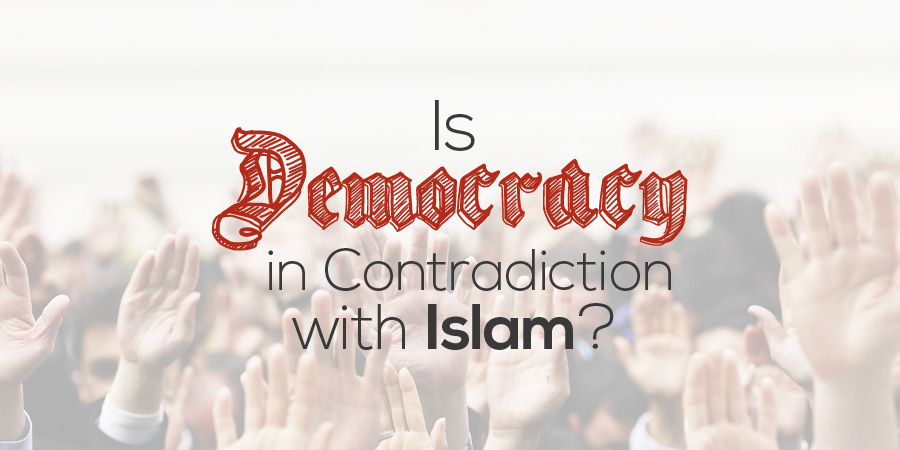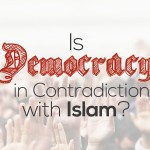Is Democracy in Contradiction with Islam? (2)

Hegemonic system’s exploitation of new concept of democracy
According to the new interpretation offered and implemented by imperialist states to advance their interests and objectives, democracy is synonymous with a secular regime—a regime which never allows religion to interfere in its sociopolitical affairs. Even if the people themselves say, “We profess this religion and want to practice our religious rites in public institutions,” that will of the people is considered inconsistent with democracy.
It is for this reason that when an election was held in Algeria in which an Islamist party won and on the basis of the principles of democracy and laws of the country, it wanted to form a government and implement Islamic laws, the oppositionists, who felt that the said party was about to rule and establish an Islamic government in future, staged a coup d’état and after declaring the election null and void, apprehended and imprisoned the leaders of the party and abolished the party and declared it illegal. After many years, the party is still not permitted to operate. This is in spite of the fact that this Muslim country obtained independence from a colonial government by sacrificing millions of people for the preservation of its Islamic identity. Nowadays, it is in a miserable state. As we read in newspapers, everyday tens of people are brutally murdered in that country.
The unelected ruling clique is still more acceptable to the arrogant and imperialist countries than the rightfully elected government of the people. This is due to fear that another country would be established in the name of Islam. “If people accept Islam and elect an Islamic government through their vote, that is not ‘democratic’ because the people have an inclination toward religion,” it is argued. So, in the new interpretation of democracy, religion should in no way interfere in the sociopolitical affairs of people even to the extent that schoolgirls must not wear a headscarf. The same democracy can also be observed in Turkey.
The agents of imperialism in Muslim countries are inculcating the notion that all Muslim countries must be administered through this democratic method. That is, no more room would be left for religion in the national administrative affairs including legislation and implementation. Through cultural onslaught and penetration of universities, even in countries with strong and deep-rooted Islamic inclination they are trying to undermine the spirit of religious fervor and propagate democracy in this sense. By doing so, they imagine that after a few decades when the revolutionary generation will be replaced by the youth who do not know the principles of the Revolution, they will make the new concept of democracy prevail.
There are, thus, three interpretations and concepts of democracy:
(1) direct involvement of people in administrative affairs practiced in one of the Greek cities;
(2) involvement of people in government through election of their representatives, existing today in many countries including ours; and
(3) all dimensions of government, including legislation and implementation, separated from religion.
That is, to be democratic means to be secular.
Islam’s ideal form of democracy
As to which of these administrative forms is acceptable to Islam, we have said earlier that if democracy in legislation means that whatever is approved by the majority of people—that is, 50% plus 1—is a credible, official and binding law even if it were against the text of the Qur’an, then Islam does not accept such democracy in legislation. Islam that has its own explicit laws in various administrative affairs, judiciary, economics, management, and related to other organs of the country does not allow a law against the explicit text and fixed decree of the Qur’an to be recognized officially. To officially recognize such a law is tantamount to rejection of Islam.
What needs further explanation and which I promised to discuss is the executive dimension of democracy, the role of the people in electing those who want to enact the laws within the framework of Islamic foundations, viz. the deputies in the Islamic Consultative Assembly. In cases where Islam has not enacted fixed and permanent laws, there is the need to enact new laws for new issues and needs, Islam has authorized the legitimate government apparatus to enact necessary laws for this domain while observing the general principles and standards of Islam and not contradicting the framework of Islamic laws, labeled by the late Shahid (Ayatullah Sayyid Muhammad Baqir) Sadr as “free zone” [mantaqah al-firagh]. The driving and traffic laws stipulate the side to move—right or left—and the speed of a vehicle. Evidently, the Qur’an and traditions have no text in this regard.
The people’s role in determining the legislators and executives that enact and implement temporary laws can be materialized by observing Islamic standards. In other words, democracy and the vital role and participation of people are practiced in our country observing limits and conditions set by Islam by electing those who qualify. Electoral candidates must be Muslims committed to Islamic laws and observe Islamic standards in enacting laws and rules. In addition to the conditions set for deputies in the Islamic Consultative Assembly, with the exception of a few deputies of religious minority groups, the rest of the representatives must be Muslims committed to observe Islamic laws.
Lest there were negligence and shortcomings and Islamic laws were not observed in enacting laws, a number of experts constituting the so-called Council of Guardians are duty-bound to conform the ratified bills of the Majlis to the Constitution and religious standards and then validate them. In the case of their nonconformity, the said bills are returned to the Majlis for review. This is the type of legislative and executive mechanism accepted in our country and no one opposes it.
Similarly, executives with the President at top must observe Islamic laws and standards. First of all, the President must possess the conditions, qualities and merits mentioned in the Constitution which are taken from Islamic laws, and in taking charge of the government he must be, so to speak, authorized by God, the Exalted in the sense that after garnering the majority vote and endorsement of the people, he must be designated by the wali al-faqih. In this case, his government shall be legitimate and credible. This is something which is implemented in our country.
With the aim of understanding the role of the people and the domain of their involvement in the Islamic system, let me cite an example. Let us assume that we were living during the caliphate of the Commander of the Faithful(‘a) and in our own city we knew of a righteous person who deserved to be the city ruler and we endorsed him to the Imam (‘a). After receiving the endorsement, the Imam (‘a) possibly designated him as the new ruler. Now, if the majority of people had such endorsement, the Imam(‘a) would highly regard their view and designate the said person as governor of one of the regions under his jurisdiction.
So, the role of the people in the government structure and administrative decision-making, in terms of theory and legitimacy, is that people decide who is the most meritorious in enacting or enforcing the law and then cast their vote in his favor. The vote of the people is equivalent to a recommendation to the leadership. In reality, it is a pact they forge with the wali al-faqih that if he designates the recommended person to the presidency, they will obey him. It is on this basis that during the time of the eminent Imam (‘a), when the majority of people elected a person to the presidency, he would say, “I do hereby designate him, who is endorsed by the people, to be the President.” That is, “the vote of the people is like an endorsement for me to accept him.”
This is the theory of the Islamic government which has no contradiction whatsoever with the second meaning of democracy. It is functioning in our country since the Revolution and no (theoretical) problem has ever emerged. Yet, if democracy means that religion should have no role in the affairs of society and none of the religious symbols be seen in the government institutions, such a thing is incompatible with Islam!
Democracy in its third sense, as interpreted by the Global Arrogance that wants to impose it on others is absolutely opposed to Islam, for it means the negation of Islam. However, democracy in its second sense has been accepted by observing the conditions set by Islam for rulers, legislators, implementers, and judges. That is why the people should seriously elect individuals who deserve to legislate and implement laws, and thus, prove their cooperation and support for the Islamic state and regard themselves as participating in the affairs of the country. This form of democracy is accepted in Islam and practiced in our country. If there are violations in some cases, they are also committed elsewhere, and one should be vigilant lest they are repeated.
Muhammad Taqi Misbah Yazdi Written by
Mansoor L. Limba Translated by

